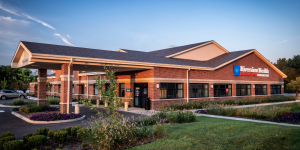Some people refer to migraine attacks as headaches, but they’re much more severe. Migraine is a neurological disease that causes intense headaches, nausea, sensitivity to light, and other painful symptoms. While migraine episodes are rare for some, others have chronic migraine attacks.
Whether you’re dealing with your first episode or have them regularly, instant migraine relief is possible. First, go over the migraine attack timeline and symptoms. Then, find out how you can get fast migraine treatments at Riverview Health Emergency Room & Urgent Care.
Migraine Attack Timeline
A migraine headache can last up to three days, but the complete episode takes longer. Many people start experiencing symptoms several days before the headache and deal with additional symptoms for two days following the migraine.
- Prodrome Stage – This stage signals that a migraine headache is coming within hours or the next few days. Some symptoms include mood changes, food cravings, nausea, and trouble falling or staying asleep. Avoid migraine triggers during this stage to reduce the likelihood of a severe migraine headache.
- Aura Stage – Auras are visual, motor, or sensory disturbances that can occur right before a migraine headache. Auras last for as little as five minutes but can persist for an hour. Migraine with aura is only diagnosed in around 25% of people with migraine.
- Headache Stage – A migraine headache can last as little as four hours or as long as three days. Migraine headaches cause intense throbbing or drilling pain that usually starts on one side of the head. The pain can travel to the other side, too. A migraine headache causes additional symptoms, such as mood distributors, nausea, vomiting, and sensitivity to stimuli.
- Postdrome Stage – You feel relief once the headache subsides, but the postdrome stage also has uncomfortable symptoms. The symptoms last one to two days, including mood changes, concentration problems, and comprehension issues. Rest, hydration, and self-care are vital during the postdrome stage.
Migraine Triggers
If you suffer from migraine headaches, identifying your triggers is a critical component of managing the condition. When possible, avoid triggers to reduce the risk of a migraine headache. Knowing your triggers can also help your doctor create a treatment plan for your migraine attacks.
The following are the most common triggers associated with migraine headaches:
- Alcoholic and caffeinated beverages
- Bright lights, strong smells, and loud noises
- Certain foods
- Hormonal changes
- Skipping meals
- Sleeping too much or too little
- Smoking
- Stress
- Sudden weather changes

How to Get Instant Migraine Relief
If you were prescribed abortive migraine medication, such as rizatriptan, you can take it for instant migraine relief. Otherwise, you’ll need to go to the emergency room or urgent care for fast treatment.
After going over your symptoms, the doctor can provide a “migraine cocktail” of medications. These cocktails often contain ketorolac for pain as well as anti-nausea medicine. Some people receive instant migraine relief after receiving the cocktail, but it can take several hours when the symptoms are severe. Even so, the pain should become less intense quickly with medical treatment.
Visit the ER for Emergency Migraine Symptoms
Aneurysms, strokes, and other severe conditions share some of the same symptoms as migraine episodes. Even if you think you have a migraine, go to the emergency room if you have any of the following symptoms:
- Migraine headache pain that persists longer than 72 hours
- Numbness, weakness, or confusion
- Speech or vision issues, unless these symptoms are common when you have a migraine
- Thunderclap headache
- Worst headache of your life
Get Instant Migraine Relief

Riverview Health Emergency Room & Urgent Care is the only health system in Hamilton County offering ER and urgent care services under one roof. Unlike most ER or urgent care centers, patients are only billed for the level of services they need. The ER is open 24 hours a day, seven days a week. The urgent care center is open from 7 a.m. to 8 p.m. daily. No appointments are necessary for in-person visits; however, pre-registration is available.
Riverview Health Emergency Room Urgent Care has four convenient locations:
- Riverview Health Emergency Room & Urgent Care Carmel is located at 14585 Hazel Dell Pkwy., Carmel, IN 46033, and may be reached at 317.406.4280.
- Riverview Health Emergency Room & Urgent Care Fishers is located at 9690 E. 116th St., Fishers, IN 46037, and may be reached at 317.406.4585.
- Riverview Health Emergency Room & Urgent Care West Carmel/Zionsville is located at 10830 N. Michigan Rd., Zionsville, IN 46077, and may be reached at 317.406.4713.
- Riverview Health Westfield Hospital is located at 17600 Shamrock Blvd, Westfield, IN 46074, and may be reached at 317.214.5555.




